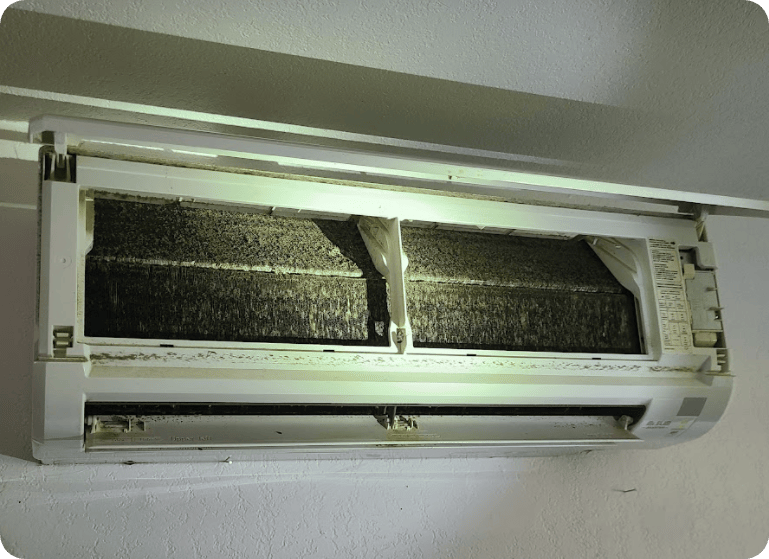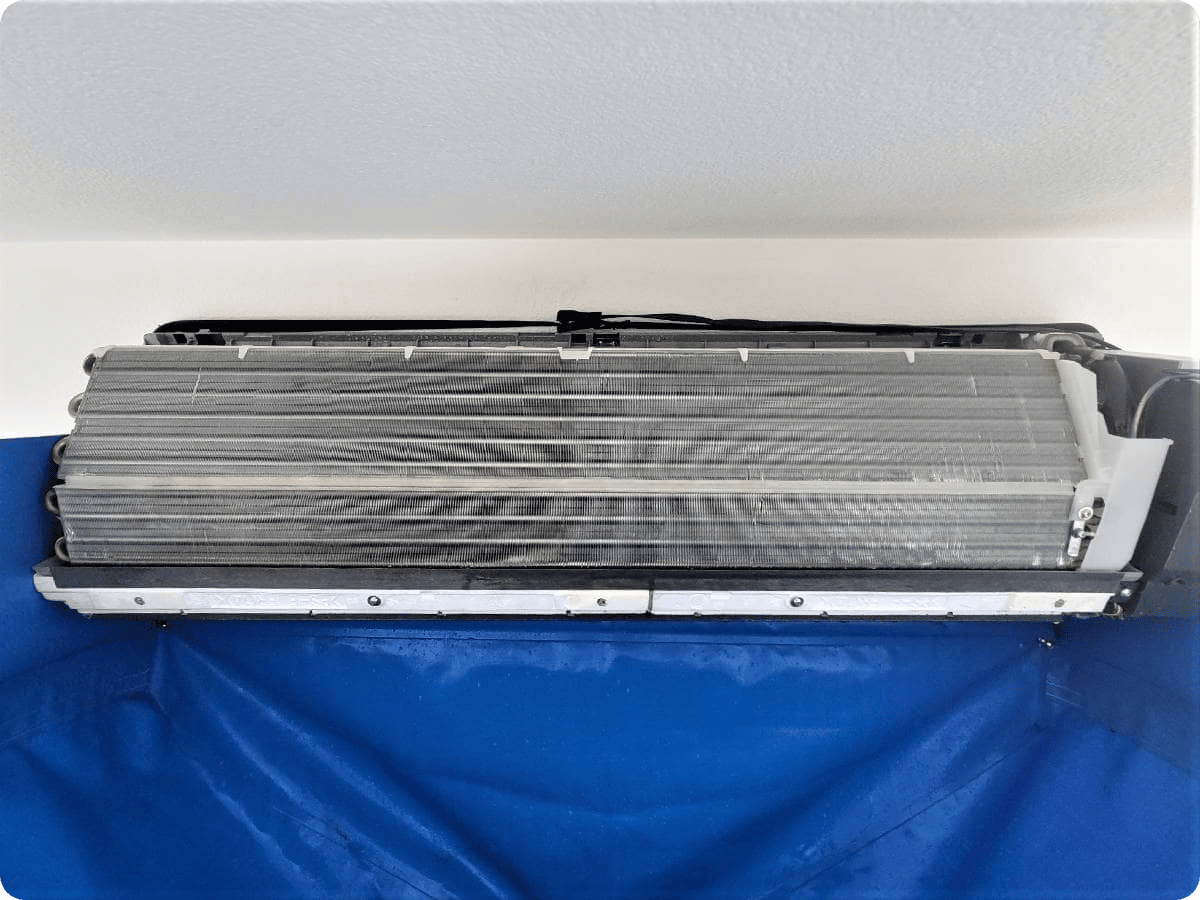Signs Of Mold Exposure In Babies (And Risks From Ductless Mini Splits)

Sure, babies get sick all the time. As the immunity they receive from their mother wanes, all those nasty germs and viruses start to take their toll until your little one builds a strong immune system of their own.
But, just knowing that it’s a natural part of life doesn’t make it any easier to watch your kid fight a cold. Nor will it stop you from worrying that there’s a bigger problem than just the sniffles.
Unfortunately, we’ve all heard the horror stories about a baby suddenly getting very sick, developing a severe health problem, or worse (and no, we’re not linking to any examples here).
As scary as that is, there’s plenty you can do (and likely already do) to keep your baby safe and healthy at home. One thing that’s easy to overlook, however, is mold exposure.
Related: 10 Early Warning Signs Of Mold Toxicity
If your home has had a mold problem before, it’s possible that trace amounts are still present or regrowing. Or, you’ve got a new problem, and your young one is the first to feel physical symptoms from it.
We’ll go through what to look for and what to do if you think a mold problem is making your child sick.
And in particular, we’re diving into this topic because of its relationship to ductless mini split heating and cooling. Our specialty is heat pump and mini split deep cleans in Boise Metro and Valley County.
People often call us because of mold problems in their homes. Others call because of problems with their system or when the air in their home feels stale or dirty.
We often find mold in the air handlers as the root of the problem when we get there.
Dangers Of Mold Exposure In Babies And Children
Mold exposure can cause problems for people of any age, especially if they’re allergic. But, babies and young children are especially vulnerable because their immune systems aren’t fully developed. And as we’ll see in the next section, it’s not always easy to pinpoint the source of the problem.
So, what happens, exactly, if your baby is exposed to mold?
The best-case scenarios for mold exposure in babies are some mild skin irritations and cold-like symptoms. They may also develop a mold allergy or experience asthma attacks. There’s also the risk of developing aspergillosis or fungal pneumonia. Or, in severe cases, pulmonary hemorrhaging. That’s when your child’s lungs weaken from exposure to toxins produced by mold spores.
As scary as that sounds, the good news is that this won’t happen right away. But, it doesn’t take all that long for symptoms — even severe ones — to set in.
Related: Mold And Biotoxin Illness At Home
For instance, that case study we cited above follows a 40-day-old baby who developed severe symptoms after two weeks of fungus and two weeks of exposure to tobacco smoke.
So, while you don’t want to freak out over every cough and sniffle, it’s also important to recognize the signs of mold exposure in babies and determine if there are other signs of a mold problem in your home.
Four Signs Of Mold Exposure In Babies
Babies often show clear symptoms of mold exposure. But, those symptoms are similar to what you’d find with other pediatric health issues, such as a cold or bronchitis, or a rash. So, it’s important to also look for general signs of mold in your home if your baby has:
- Stuffy, runny nose
- Itchy, watery, or red eyes
- Shortness of breath, coughing, or wheezing
- Rashes or skin irritation
What To Do If Your Baby Shows Signs Of Mold Exposure
Contact your doctor right away if you suspect a mold exposure problem in your baby — especially if they have a fever or trouble breathing. Stay with a friend or family member for a few days and see if the symptoms disappear. And look for signs of mold in your home.
If it seems like there’s only a tiny amount of mold in your home, cleaning with bleach may solve the problem. For larger infestations, you’ll need mold remediation.
How To Reduce Mold Exposure For Your Baby At Home
Here are some easy, DIY steps to reduce mold growth and exposure in your home:
- Control Humidity
- Declutter
- Fully Dry Laundry
- Avoid Dampness
Humility, or moisture in the air, creates excellent breeding grounds for mold spores. The same goes for damp cellars or even carpets and rugs that get wet (particularly in or near bathrooms)
Decluttering eliminates dark, out-of-the-way places for mold to grow without you noticing. Think in boxes, behind books, or under piles of clothes somewhere.
And, speaking of clothes, make sure all your laundry is completely dry. Mold spores can and will grow on clothes if they’re still damp when you put them away.
Mold Risks WIth Ductless Mini Splits
Ductless mini splits provide excellent and energy-efficient heating and cooling. They’re also very popular for nurseries because they’re so whisper-quiet, and you can control the temperature in that one room down to the degree. The downside? They often end up full of mold spores that circulate into the air your baby breathes.
Read More: Healthy Indoor Air Quality Is Crucial For People With Asthma
Here’s the problem: The inside of the air handler in the room is dark (no lights in there), warm (heat in the air plus warmth generated by the electronics), and moist (water vapor that condenses during the dehumidification process).
Those are the exact conditions for mold spores to thrive. And, since you can’t take apart the system, you can’t clean the spots where those spores are most likely to grow: on the condenser coil and behind the barrel fans.
Here’s a picture of a dirty coil we came across in a recent cleaning:

We often encounter situations like this, especially with systems more than a year old.
Fortunately, our process, tools, and non-toxic cleaning agents have been specially designed to flush out all mold spores, plus dirt, bacteria, and other contaminants, from your air handlers and heat pump.
Related: How Often Should A Mini Split Be Cleaned?
To prove that point, here’s a photo of a coil we started cleaning. We stopped halfway through to show the homeowner our progress:

You can see for yourself just how much grime and organic contamination (including mold) we can get rid of in one fast, easy, non-invasive visit.
If you’re worried about mold in your mini split or are concerned about the air quality in your Treasure Valley home, call HydroKleen208 at (208) 779-5596. We’re happy to answer all your questions and help you decide how to make your home healthier for the whole family.
